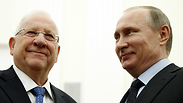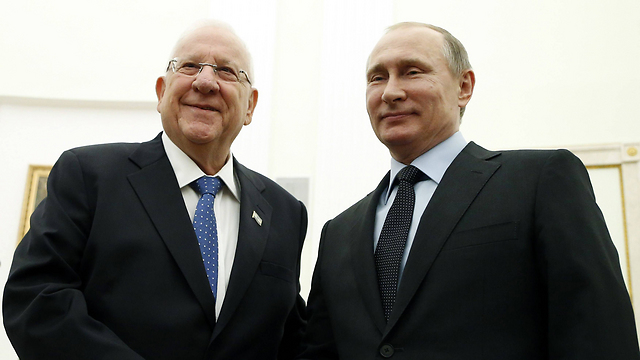
Rivlin and Putin
צילום: AFP
Rivlin presents Israel's red lines on Syria to Putin
Following the Russian withdrawal from the war-torn country, the Israeli president, working in conjunction with Netanyahu, stressed to his Russian counterpart that Israel is interested in keeping its military cooperation with Moscow, and wants the return of UNDOF peacekeepers to the Golan.
MOSCOW - During his three-hour-long meeting with Russian President Vladimir Putin on Wednesday, President Reuven Rivlin outlined Israel's new red lines on Syria in the wake of Moscow's decision to withdraw its troops from the war-torn country and the ongoing efforts to launch talks to end its civil war.
"I felt like I was sent to the frontline as the envoy of the prime minister, the defense minister and the chief of staff, with whom I spoke in order to formulate the messages to convey to the Russian president," Rivlin said after the meeting.
The first red line deals with the imperative to prevent Iranian military presence on Israel's northern border at any cost. To that end, the IDF has been - according to foreign reports - preventing the transfer of advanced weapons from Syria to Hezbollah in Lebanon, by reportedly bombing any such shipment.
This is the course of action Israel would also take if, later on, the Iranians move military or Revolutionary Guards units close to the Golan Heights border.
Another red line that came up in the meeting between the two presidents, even if only indirectly, was that Israel is not willing to withdraw from the Golan Heights and that it would have to be recognized as a part of Israel in any kind of future agreement.
Rivlin sought to stress to his host that the borders of Syria were determined 100 years ago in the Sykes-Picot Agreements, which artificially divided the Middle East, so there is no reason to stick to those borders. In fact, Rivlin stressed to Putin, there is a need to redraw the borders for countries like Syria and Iraq to reflect the changes to the region.
The heads of the defense establishment also want to ensure that Russia supports a UN resolution to return UNDOF peacekeepers to the Golan Heights, after the UN troops evacuated their bases over the course of the civil war.
Rivlin also expressed Israel's desire to continue military coordination between the IDF and the Russian forces that will stay in Syria.
In the meeting, Putin tried to convey Russia's deep commitment to ensuring the security of the people of Israel and to safeguarding Israel's interests. The Russian president reiterated that hundreds of thousands of Russian citizens immigrated to Israel, while many other Russians travel to Israel as tourists. "I have a personal commitment towards all of the Russians who immigrated to Israel," Putin said.
The Russian president also asked Rivlin what Israel's plans were to advance the peace process with the Palestinians. Rivlin responded that in light of the past 20 years of failed attempts to reach a final-status agreement, it is best for the sides to focus on a solution to the Israeli-Palestinian conflict that will be done in stages, as each move is cautiously examined.
The Israeli president was referring to proposals made in the defense establishment to pull IDF soldiers out of the large cities in the West Bank in return for the Palestinian Authority's commitment to keep the peace in the territories.
Rivlin reported the contents of the meeting with Putin to Prime Minister Netanyahu, Defense Minister Ya'alon and IDF Chief Eisenkot. He was joined by Israeli Ambassador to Russia Zvi Heifetz, the President's Military Secretary Brig.-Gen. Hasson Hasson and the President's Residence director-general.
Putin was joined in the meeting by his close advisor on foreign affairs Yuri Ushakov, the deputy prime minister Arkady Dvorkovich, and a translator.











